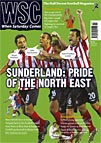The new WSC contains an illustrated history of football calendar for the new season, and our 'Surviving the crunch' 2008-09 season preview featuring every English league and SPL team.
Both are available with the latest issue of WSC on sale now.
The new WSC contains an illustrated history of football calendar for the new season, and our 'Surviving the crunch' 2008-09 season preview featuring every English league and SPL team.
Both are available with the latest issue of WSC on sale now.
 Dear WSC
Dear WSC
Bruce Wilkinson (WSC 267) pointed out that ticket queues “seem a quaint ritual of a bygone age”. Waiting in a virtual internet queue bears no similarity to lining up outside the box office. I have my tickets for the FA Cup final, but I do not feel as if I earned them. Instead of getting up in the middle of the night, crossing London, losing half a day’s work, standing in the rain shuffling forward inch by inch while nervous that there are too many punters and too few tickets, I merely sat in my dressing-gown in front the PC. There is no one to talk to in the “virtual waiting room”. Your opportunity is allotted randomly. Suddenly it’s all over and you have what you came for. One should be happier as the process is simple and efficient and the desired result achieved, but somehow it feels like a hollow victory as it lacks the sense of accomplishment joy and triumph of the old-fashioned process. You can’t even wave the tickets in triumph above your head as they are sent by post.Obviously my complaining about the changes that actually improve my life marks me down as “old”. I am not asking to bring back rickets and polio and to repeal the Factory Acts but I do miss a modicum of discomfort and inconvenience. The old experience was akin to standing on the terraces or being subject to the over-zealous policing that used to mark us out as a tribe. Under the new regime the tickets are yours if your broadband speed is faster and your credit card more golden than the next, rather than if you have more commitment stamina and perseverance.Will the ultimate progress be when we treat football like theatre and opera by dressing-up smartly for the occasion and ordering our interval drinks? Or is that Club Wembley?
Patrick Sheehy, London
 Simon Cotterill examines the legacy of half-filled stadiums from the 2002 World Cup
Simon Cotterill examines the legacy of half-filled stadiums from the 2002 World Cup
There was dismay in Japan and South Korea when FIFA announced in 1996 that the 2002 World Cup would be shared between them. The countries’ relationship was frosty at best and the bidding war between them had been fierce, bitter and expensive. Although shocked at FIFA’s unprecedented decision, both were at least relieved that they hadn’t actually lost the vote, and so set about trying to out-do each other by pumping billions into football facilities.
 Steve Wilson reports on how the race to become West Asian representative on FIFA’s executive committee turned personal
Steve Wilson reports on how the race to become West Asian representative on FIFA’s executive committee turned personal
Asian football may lag behind its European and South American counterparts, but a recent election to fill the position of West Asian representative to FIFA’s executive committee proved they are a match for anyone when it comes to political back biting and mudslinging. The acrimonious campaign plumbed such depths, with allegations of mental illness, vote buying and personal vendettas, that it became too unpalatable even for Sepp Blatter, who was forced to play the unlikely role of moral arbiter.
 Quito’s El Nacional pick only native players, a policy that is coming under increasing pressure. Henry Mance reports
Quito’s El Nacional pick only native players, a policy that is coming under increasing pressure. Henry Mance reports
As a boy, Juan Carlos Burbano knew never to support foreigners; for a decade as a player, he tried never to pass to them; and now as a coach he is determined to beat them. Such is a life with El Nacional, the Ecuadorian club which only fields locally-born players. “If the national team can do it, why can’t El Nacional?” says Burbano, referring to Ecuador’s unprecedented qualification for the 2002 and 2006 World Cups. “We’ve got low self-esteem in Ecuador, and sport has helped it recover”. El Nacional’s “pure creoles” rule was the idea of their founder, an army captain. Forty-five years later the rule remains, as does military control.